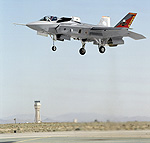Pentagon confirms 1-year delay for JSF
 Pentagon officials on Feb. 16 confirmed Deputy Defense Secretary Bill Lynn’s announcement one day prior that the F-35 Joint Strike Fighter program will be delayed by about one year.
Pentagon officials on Feb. 16 confirmed Deputy Defense Secretary Bill Lynn’s announcement one day prior that the F-35 Joint Strike Fighter program will be delayed by about one year.
The Pentagon’s No. 2 official said this week that the jet’s development schedule would slip between 12 months and 13 months despite an aggressive restructuring of the program that was announced earlier this month.
“The development was originally projected to last an additional 30 months; we think with the additional test aircraft it will be closer to a delay of about 12 or 13 months, but I can’t give you the cost numbers,” The Australian newspaper quoted Lynn as saying during a speech at a shipyard in South Australia. He did not say if this would affect the delivery timeline for the JSF.
The delay is a result of the integration of additional test aircraft that were mandated under the restructuring, which also extended system development and design until 2015, according to a Pentagon official.
“That is a true statement, the driver on this is the test aircraft,” the official said Feb. 16. “The driver on this whole thing, about a year, is due to the additional test aircraft.”
Like Lynn, the official would not comment on how this will affect the delivery schedule for the plane. The Marine Corps is set to get its first F-35s in 2012, with the Air Force and Navy scheduled to receive their jets in 2013 and 2014, respectively.
On Feb. 1, Steve O’Bryan, Lockheed’s vice president for F-35 business development, told reporters that while the jet’s flight tests are roughly six months behind schedule, the company will deliver the plane in time to meet the Marine Corps’ initial operating capability date of 2012.
“I think you’ll see that we’re going to deliver all the SDD jets by the end of this year and get them in flight test,” O’Bryan said.
Under the Pentagon’s restructuring that was announced Feb. 1, Defense Secretary Robert Gates ordered an additional test jet and $2.8 billion be put into the extended F-35 SDD, withheld more than $600 million in performance fees from Lockheed, cut planes from F-35 acquisition coffers and fired Marine Corps Maj. Gen. David Heinz, the Pentagon’s F-35 program manager.
The Defense Department is requesting $10.7 billion in its 2011 budget to continue development on the F-35 and purchase 43 of the planes.